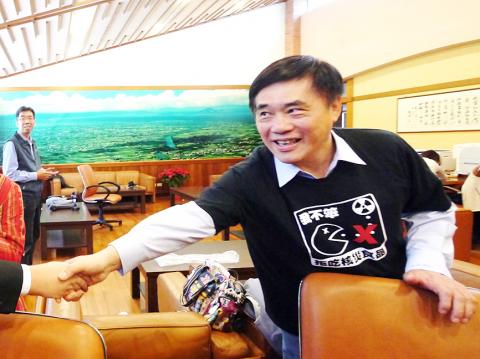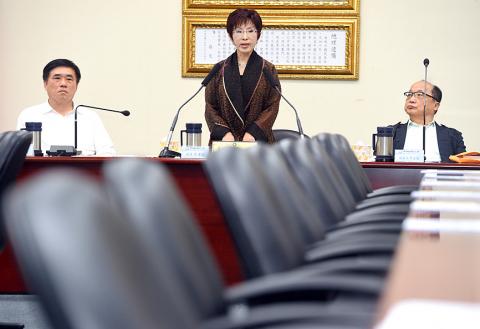Chinese Nationalist Party (KMT) Vice Chairman Hau Lung-bin (郝龍斌) yesterday questioned the legitimacy of a motion aimed at moving forward the party’s next chairperson election by two months, a move that was passed by the KMT’s Central Standing Committee at a meeting on Wednesday that did not have a quorum.
During a morning visit to the KMT’s Yilan County Council caucus, Hau said that although he does not have much of an opinion about the KMT leadership’s decision to move the chairperson race forward, the change should have gone through a democratic process.
“Democracy is important and so is solidarity, but the latter would not be possible without the former,” Hau said.

Photo: Chien Huei-ju, Taipei Times
“It is imperative that the leader of the party work to ensure the rationality of its system, democracy and tolerance of plurality,” Hau said, adding that the motion should be carefully deliberated at the committee’s routine meeting on Wednesday next week.
In response to media inquiries about his intention to run in the election, the former Taipei mayor said he has been dogged by such questions wherever he goes and he feels a continuous fixation on the issue would nullify any efforts to “actually get things done.”
If the KMT cannot grasp the needs of the people, it does not matter who is the chairperson, Hau said, adding that only a party capable of doing so could gain public recognition.

Photo: Liao Chen-huei, Taipei Times
Hau’s remarks came one day after KMT Chairwoman Hung Hsiu-chu (洪秀柱) railroaded the motion through the committee meeting, which was boycotted by 26 committee members opposing the proposal.
According to KMT regulations, a quorum for a meeting of the party’s Central Standing Committee should consist of at least half of the 40 eligible participants, who are the chairperson, five vice chairmen and 34 members.
However, Wednesday’s session was only attended by Hung, three vice chairmen and 10 committee members, including two who the KMT said asked someone else to sign in on their behalf.
It is reported that after waiting for an hour for a quorum to be reached, the KMT management, citing regulations promulgated by the Ministry of the Interior, said that as the committee is a permanent one, it is allowed to change the quorum.
Hung called the meeting to order after declaring that the quorum should be 13, because 14 committee members had asked for a leave of absence, a decision that has reportedly prompted committee members who boycotted the session to take legal action.
KMT Culture and Communications Committee deputy director Mao Chia-ching (毛嘉慶), one of Hung’s closest aides, on Wednesday said that prior to the meeting he saw Hau having a meal with some of the committee members who boycotted it.
Hau said at the meeting that there is no need to invent conspiracy theories and backstab, remarks apparently aimed at Mao.
The motion, unveiled by KMT Central Policy Committee director Alex Tsai (蔡正元) on Monday, plans to hold the next chairperson election on May 20, instead of July 20, to conform with the party charter.
The move has been interpreted by some as an attempt by Hung to force other potential chairperson hopefuls, including Hau and former vice president Wu Den-yih (吳敦義), to announce their bids.
Hung said that while it was regrettable many committee members did not attend the meeting, at least the motion was passed in accordance with the regulations.
“If there are party members who still do not understand the motion fully, I am willing to do my best to explain it to them,” Hung said, adding that the proposal is aimed at ensuring the term of a party chairperson only lasts four years, as stipulated in the KMT charter.

CHAOS: Iranians took to the streets playing celebratory music after reports of Khamenei’s death on Saturday, while mourners also gathered in Tehran yesterday Iranian Supreme Leader Ayatollah Ali Khamenei was killed in a major attack on Iran launched by Israel and the US, throwing the future of the Islamic republic into doubt and raising the risk of regional instability. Iranian state television and the state-run IRNA news agency announced the 86-year-old’s death early yesterday. US President Donald Trump said it gave Iranians their “greatest chance” to “take back” their country. The announcements came after a joint US and Israeli aerial bombardment that targeted Iranian military and governmental sites. Trump said the “heavy and pinpoint bombing” would continue through the week or as long

TRUST: The KMT said it respected the US’ timing and considerations, and hoped it would continue to honor its commitments to helping Taiwan bolster its defenses and deterrence US President Donald Trump is delaying a multibillion-dollar arms sale to Taiwan to ensure his visit to Beijing is successful, a New York Times report said. The weapons sales package has stalled in the US Department of State, the report said, citing US officials it did not identify. The White House has told agencies not to push forward ahead of Trump’s meeting with Chinese President Xi Jinping (習近平), it said. The two last month held a phone call to discuss trade and geopolitical flashpoints ahead of the summit. Xi raised the Taiwan issue and urged the US to handle arms sales to

State-run CPC Corp, Taiwan (CPC, 台灣中油) yesterday said that it had confirmed on Saturday night with its liquefied natural gas (LNG) and crude oil suppliers that shipments are proceeding as scheduled and that domestic supplies remain unaffected. The CPC yesterday announced the gasoline and diesel prices will rise by NT$0.2 and NT$0.4 per liter, respectively, starting Monday, citing Middle East tensions and blizzards in the eastern United States. CPC also iterated it has been reducing the proportion of crude oil imports from the Middle East and diversifying its supply sources in the past few years in response to geopolitical risks, expanding

Pro-democracy media tycoon Jimmy Lai’s (黎智英) fraud conviction and prison sentence were yesterday overturned by a Hong Kong court, in a surprise legal decision that comes soon after Lai was jailed for 20 years on a separate national security charge. Judges Jeremy Poon (潘兆初), Anthea Pang (彭寶琴) and Derek Pang (彭偉昌) said in the judgement that they allowed the appeal from Lai, and another defendant in the case, to proceed, as a lower court judge had “erred.” “The Court of Appeal gave them leave to appeal against their conviction, allowed their appeals, quashed the convictions and set aside the sentences,” the judges